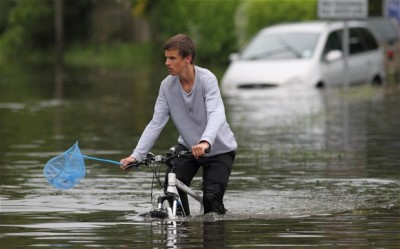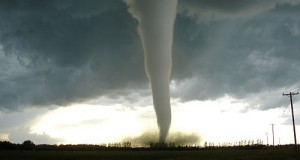As we stock up our survival stash, prepare our survival kits, make our survival plans, and learn our survival skills, could we be missing the most important component for survival?
What’s what? Responding calmly to a crisis by not panicking. That is – your emotional reaction to disaster. Panic can cripple you, making it impossible to survive.
For example, what will be our true response when what we are preparing for actually happens? What if it happens a little bit differently than we prepared for? What if we were prepared to survive alongside our family, and instead are stuck trying to survive with a group of unprepared strangers? What if we were prepared to survive in the wild, and instead are stuck in a city? What if adaptation, common sense and the ability to work with others end up being the most important keys to our survival?
An Amazing Breakthrough In Compact Portable Backup Power — Easily Fits In Your Pocket Or Backpack!
All too often, our first response to change is panic. When we panic we send our bodies into a major adrenaline rush that could give us the speed to run from a tiger. That’s great – if the threat is a tiger. But most of the time, our problems aren’t that kind of emergency. When the grid has gone down, or we’ve gotten lost or stranded, a panic attack will only make our bodies burn fuel and get exhausted that much faster. We will not be able to think beyond a basic urge to run or fight.
So the first thing to do is to relieve that panic. To let go of the automatic fear and be filled with a sense of calm. From that state, you will be able to function and deal with the situation much better. This is no easy task, and on top of this you may be needing to coach others into a reasonable state of mind as well. In the event you do end up with family or friends in a survival situation, it will be good to have helped them prepare for this ahead of time.
To calm your panic, the first thing to do is to focus on your breathing. Try not to think about anything but deep breaths, going in and out through your nose. This will help both your body and mind calm down. To make this easier for yourself and make it easier to coach others, it is a good idea to practice this whenever stress or change arises in your everyday life. If you can get yourself in the habit of calming down when something unexpected happens, then it will be much easier to do when the situation is totally overwhelming.
Once your breathing is consistent and your heart rate has slowed some, you can begin assessing the situation and look at the options. You can do this verbally with a group or by yourself. While facing the new challenges it is important to protect yourself from going into a panic. Start by looking for opportunities instead of difficulties, and searching for the best possible outcomes instead of the worst-case scenarios. This way you can point your mind in the right direction and see solutions instead of fears or worries. Then you can make a plan and overcome whatever obstacles there are. Remember, fear is crippling, but faith is empowering and gives you the ability to do things you never thought you could do. So be prepared for the worst, but expect and believe for the best.
Ultra-Efficient Water Filter Fits In Your Pocket!
To better assess your situation and see all possible solutions and opportunities, it’s important to allow yourself to get creative. One of the best ways to continue to stay calm and find creative solutions is to find something humorous about it. If you can keep the situation light, it seems less overwhelming. It will be more like a challenging new game than a serious life-or-death situation. When you find a problem funny, it makes the problem smaller and opens your mind to see more possible solutions. Also, laughing releases hormones that will help you and others stay energized, focused and positive.
To survive, sometimes you don’t have to do anything but stay calm and conserve your energy. There are some things we can control and many things we can’t. Letting go of all the things we can’t control gives us a peace in the storm that will carry us through to the end or to the next step.
In working with others in survival situations, you have to remember that you can only control yourself, not others. If another person goes into a panic or a rage, there is only so much you can do. If they are overwhelmed by fear, you can try to explain to them the importance of staying calm and show them that there is no imminent threat to run from at the moment. But don’t completely exert yourself, as you can get completely worn out if they are not accepting the help. Often, the best thing to do is to protect yourself and others until the individual wears themselves out. They will get a chance to rest and recover before the next move needs to be made.
Communicating solutions with the group can be quite difficult when they have not released their fear or when you are finding possible solutions based on your intuition or your “gut feelings.” But survival situations are no time for people to get wrapped up in their heads and make decisions based on fear. So there may be some cases where groups have to split up and some will not make it. All you can do is your best and hope that they listen to reason.
And always remember, you can’t control anyone or anything but yourself.
How do you cope during survival situations? Leave your suggestion or tips in the section below:
 Off The Grid News Better Ideas For Off The Grid Living
Off The Grid News Better Ideas For Off The Grid Living





